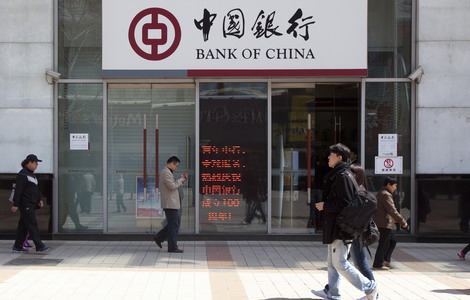 |
|
|
|
|||||||||||
|
 |
|
A Bank of China Ltd branch in Beijing. [Photo / Bloomberg] |
Mortgage interest rates have fallen recently in Chinese first-tier cities, a sign the country's property market is gradually reviving, analysts say.
Large banks in Shanghai and Beijing have said they will be adjusting the terms they offer on loans to first-time home buyers. Most of the changes are to come within a month.
Some banks plan to reduce the interest rates charged to such borrowers to as low as 15 percent below the current 7.05 percent benchmark level, which is set by the country's central bank. State-owned lenders, commercial banks and foreign-funded banks have all expressed intentions to make that change.
The Bank of China Ltd's Shanghai branch has started to offer a 15 percent discount on the mortgage interest rates offered to first-time home buyers with good credit records. It had previously charged up to 10 percent above the benchmark rate.
"The adjustment was made about a month ago," said a source with the bank, who declined to be named. "If an applicant prepares all of the required documents, he will only have to wait 10 days to be approved."
Since April, China Everbright Bank Co Ltd has also lowered the mortgage interest rate it offers qualified clients by 15 percent, said a client manager with the bank's Shanghai branch, who declined to be named.
Foreign banks have also joined the fray. In Beijing, Hong Kong and Shanghai Banking Corp Ltd has been offering 15 percent discounts since last month to first-time home buyers who took out loans worth 1 million yuan ($158,700) or more, said a bank clerk who declined to be named. Clients who borrow smaller amounts, though, can only enjoy a 10 percent discount, she added.
Most foreign-funded banks can offer discounts of 10 to 15 percent, said a source who works with Standard Chartered Bank (China) Ltd.
According to the source, Standard Chartered continues to offer the benchmark rate. But Citi Bank (China) Co Ltd has lowered its mortgage interest rate by 15 percent since the outset of this year.
Last year, a State-supported campaign to deflate a bubble in the property market caused first-time home buyers to be only able to apply for loans carrying a mortgage interest rates set at 10 percent above the benchmark level.
Bank customers might find themselves waiting for two months to obtain loans only to be told that their request had been turned down because of the credit crunch.
And not all banks have lowered their rates. A China Construction Bank Corp clerk, who also declined to be named, said there is "little room" for a downward adjustment of rates in Shanghai and that the bank now lends at the benchmark level.
The Bank of Shanghai Co Ltd also operates at the benchmark level, partly to avoid liquidity troubles, said an insider with the bank.
The reason that credit policies are being loosened also has to do, to a certain extent, with the fact that banks were already offering interest rates below the benchmark without requiring borrowers to first meet high standards, said Zhang Dawei, market research director with the Beijing Centaline Property Agency.
Zhang said the change will help in dealing with inelastic demand, which pertains to necessities. Newlywed couples, for instance, often have a need to buy apartments and growing families have a need to move into larger homes.
The 15 percent discount will prevent 150,000 yuan in additional interest from being paid on a mortgage loan of 1 million yuan that is to be paid off over 20 years.
Xue Jianxiong, an analyst from the China Real Estate Information Corp, does not think increased sales of residential apartments will cause property prices to rise.
Xue said the trade in residential apartments in Shanghai slumped slightly in the first week of April after hitting a peak in March, revealing that the market recovery that was bolstered by inelastic demand had come to a standstill.
"As the preferential credit policy may help drive up demand, the surge in sales may push up prices. That would, in turn, deter first-time buyers who are most likely to react to higher prices. In that case, the market would again reach equilibrium."
hewei@chinadaily.com.cn